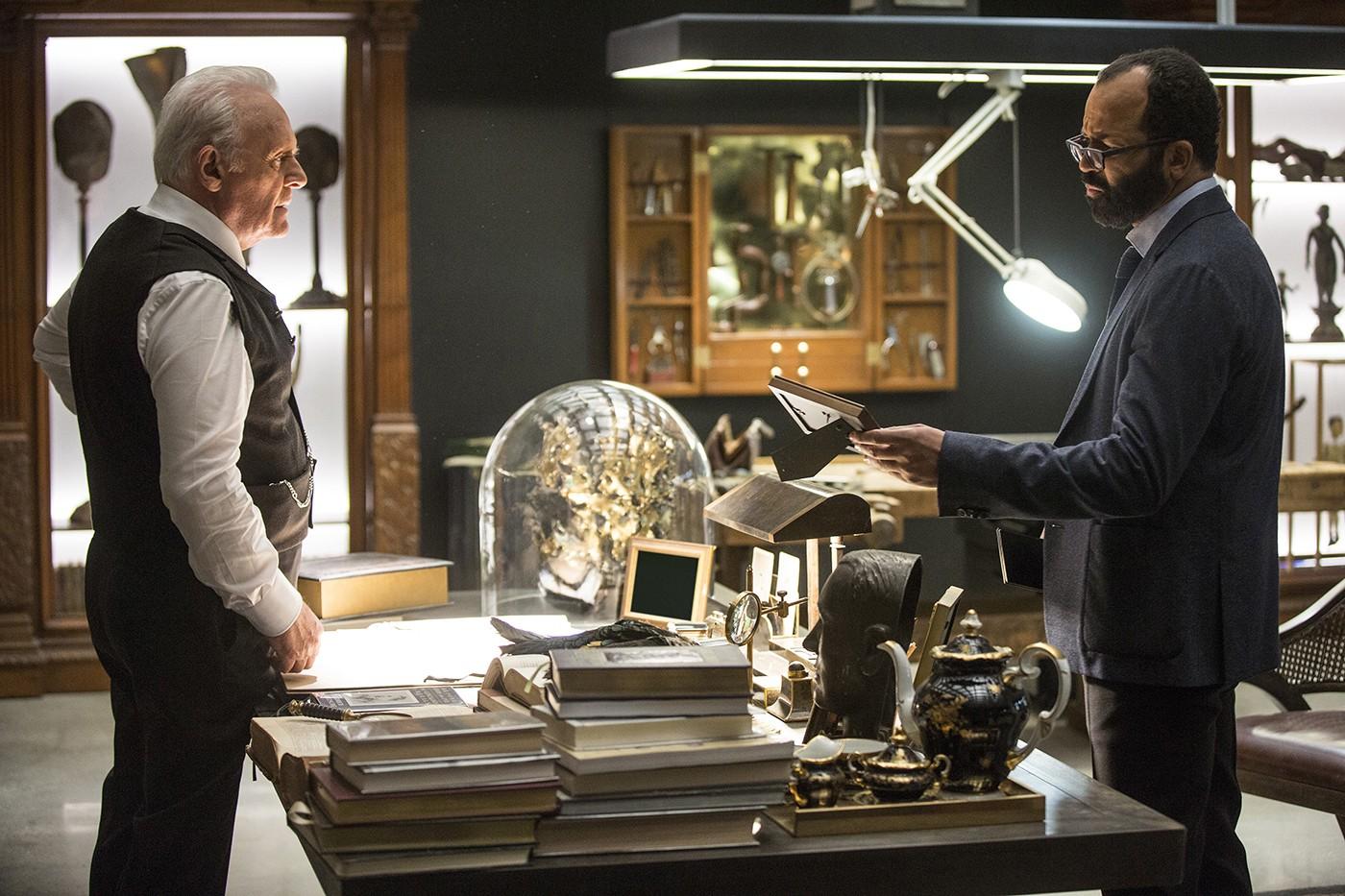Westworld’s novelty is its retelling of the classic AI story from the perspective of the AI, so it’s more than a little strange for the show to offer up a human-centric episode like “The Stray” so early in its run. Westworld’s third hour has plenty of the scripted romance between hosts Teddy (James Marsden) and Dolores (Evan Rachel Wood). Except here, their stories are accessories to those of their handlers: Teddy becomes a pawn in creator Robert Ford’s (Anthony Hopkins) sprawling new narrative, and Dolores becomes a test case for Bernard’s (Jeffrey Wright) conflicted, self-interested views on potentially conscious hosts. It’s a necessary, if presumably temporary, pivot, allowing Westworld to fill in backstory and motivation. But it’s one that feels counter to the spirit of the show.
The episode belongs (mostly) to Ford, the park founder — co-founder, it turns out — who finally reveals a more defined personality than “mysterious guru with rather poetic thoughts on the nature of boredom.” Surprisingly for someone so given to dreamy speeches and spending long hours with his creations, he’s a hard-line member of the “robots are not people and never will be” school, harshly reprimanding a lackey for attempting to preserve a host’s modesty: “It doesn’t get cold. It doesn’t feel ashamed. It doesn’t feel a single, solitary thing we haven’t told it to, understand?” On the one hand, one would presumably have to feel this way to work at the park for 30 years. On the other, it’s Ford’s own update that introduced consciousness into the hosts in the first place, possibly intentionally and possibly for reasons involving his ex-partner Arnold, the dreamer to Ford’s pragmatist who actually wanted the hosts to be conscious. (Arnold died in the park under mysterious circumstances and was subsequently erased from Westworld’s public history, but the glitching hosts seem to know who he is.) Slashing a dormant host’s face open certainly indicates Ford means what he says, but going forward it’s probably best not to take what he says with a grain of salt.
Because this is largely Ford’s episode, we experience the hosts as he does: as objects. In a programming session, Teddy finally gets a proper backstory instead of the “formless guilt” his architects gave him as a placeholder — but those memories are simply a means to an end, one that’s just as tragic for Teddy as being gunned down so guests can “have their way” with Dolores. We feel sympathy for him, but don’t possess the empathy we have with the gradually more independent Dolores. He’s still a dupe, which makes it hard to feel anything for him beyond simple pity.
Meanwhile, Westworld staffers Elsie and Ashley (yes, Luke Hemsworth’s actual in-show name is Ashley) take aboveground adventure that similarly sidelines the host they’re out to retrieve. The programmer and the muscle guy are doing a buddy-cop-meets-odd-couple thing, teaming up to fetch a character who’s wandered off script and into a ditch. To them, the episode’s namesake wandering host is a malfunctioning machine, and then a physical threat: something it’s their job to subdue and repair so the park can return to its normal course. As Elsie explains in one of several exposition dumps, robot backstories and their seemingly superfluous details are actually part of the guest experience. They serve a strictly utilitarian purpose, “anchoring” the host and dictating their behavior within a given story line. In essence, she’s telling us how the park is supposed to work — the better for us to understand just how intensely it’s going off the rails. This episode belongs to the park employees because they’re uniquely equipped to spell out the status quo.
This upside-down week, Dolores is the only host with significant screen time dedicated to her inner life, because Bernard is the only Westworld employee who recognizes that she has one. (Maeve is sidelined with little more than a passing flashback.) Both Dolores and Bernard reach the point of no return in “The Stray”: Bernard decides to let Dolores continue approaching self-awareness rather than reset or even retire her, presenting Dolores with the Westworld version of “blue pill, red pill,” and honoring her answer, as well as its potential consequences, by letting her remain as she is.
Back in the park, Dolores uses that self-awareness to overcome her preprogrammed aversion to killing. Her victim isn’t a guest, just a host the park can fix up and put back in action in a matter of hours. But the significance isn’t her action’s immediate fallout; it’s what it symbolizes for Dolores and her slow but steady path to sentience, agency, and maybe, just maybe, avenging herself on the park’s guests and the employees who enable them. Her confusion is sharpened into anger just as she has gained the means to act on it.
As Ford himself says, Dolores exists to be victimized. In the moment when she pulls the trigger and shoots her would-be rapist, she exists for herself.
Disclosure: HBO is an initial investor in The Ringer.
